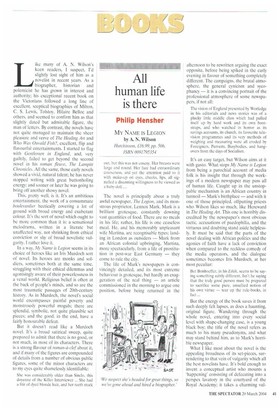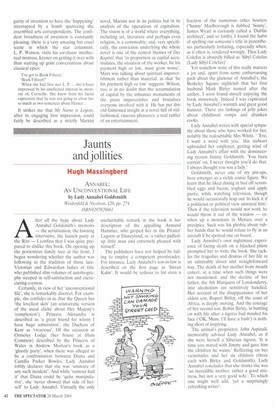All human life is there
Philip Hensher
MY NAME IS LEGION by A. N. Wilson Hutchinson, £16.99, pp. 506,
ISBN 0091795354
Like many of A. N. Wilson's keen readers, I suspect, I'd slightly lost sight of him as a novelist in recent years. As a biographer, historian and polemicist he has grown in interest and authority; his exceptional recent book on the Victorians followed a long line of excellent, sceptical biographies of Milton, C. S. Lewis, Tolstoy, Hilaire Belloc and others, and seemed to confirm him as that slightly dated but admirable figure, the man of letters. By contrast, the novels have not quite managed to maintain the sheer pleasure and verve of The Healing Art and 14,7-zo Was Oswald Fish?, excellent, flip and flavourful entertainments. I started to flag with Gentlemen in England, and, very guiltily, failed to get beyond the second novel in his roman fleuve, The Lampitt Chronicles. All the same, those early novels showed a vivid, natural talent; he has never stopped writing with great buttonholing energy; and sooner or later he was going to bring off another showy novel.
This, pretty well, is it. It's an ambitious entertainment, the work of a consummate boulevardier hectically covering a lot of ground with broad energy and exuberant colour. It's the sort of novel which ought to be more common than it is: a sensational melodrama, written in a literate but unaffected way, not shrinking from ethical conviction or shy of broad novelistic vulgarity. I rather love it.
In a way. My Name is Legion seems in its choice of heroes like an Iris Murdoch sort of novel. Its heroes are monks and soldiers, sometimes both at the same time, struggling with their ethical dilemmas and agonisingly aware of their powerlessness in a venal world. Religious belief is often at the back of people's minds, and so are the most traumatic passages of 20th-century history. As in Murdoch, the novel's social world encompasses painful poverty and monstrously powerful moguls; there are splendid, symbolic, not quite plausible set pieces; and the good, in the end, have a fairly honourable defeat.
But it doesn't read like a Murdoch novel. It's a broad satirical sweep, quite prepared to admit that there is no good, or not much, in most of its characters. There is a strong flavour of roman-a-clef about it, and if many of the figures are compounded of details from a number of obvious public figures, some of the minor characters are to my eyes quite shamelessly identifiable:
She was considerably older than Sinelo, this doyenne of the Killer Interviewer ... She had a friz of dyed blonde hair, and her teeth stuck out, hut this was not unsexy. Her breasts were large and round. Her face had extraordinary coarseness, and yet the attention paid to it with make-up on eyes, cheeks, lips, all signalled a disarming willingness to be viewed as a baby-doll ....
The novel is principally about a truly awful newspaper, The Legion, and its monstrous proprietor, Lennox Mark. Mark is a brilliant grotesque, constantly downing vast quantities of food. There are no meals in his life; rather, his life is one ceaseless meal. He, and his memorably unpleasant wife Martina, are recognisable types; landing in London as outsiders — Mark from an African colonial upbringing, Martina, more spectacularly, from a life of prostitution in post-war East Germany — they come to rule the city.
The life of Mark's newspapers is convincingly detailed, and its most extreme behaviour is grotesque, but hardly an exaggeration of the real thing — an article commissioned in the morning to argue one position, before being returned in the afternoon to be rewritten arguing the exact opposite, before being spiked in the early evening in favour of something completely different. The campaigns, the brutal atmosphere, the general cynicism and sycophancy — it is a convincing portrait of the professional atmosphere of some newspapers, if not all:
The vision of England presented by Worledge in his editorials and news stories was of a plucky little middle class which had pulled itself up by hard work and its own bootstraps, and who watched in horror as its savings accounts, its church, its favourite television programmes and its very methods of weighing and measuring were all eroded by Foreigners, Perverts, Busybodies, and hangovers from the days of Socialism.
It's an easy target, but Wilson aims at it with gusto. What stops .y,v Name is Legion from being a parochial account of media folk is his insight that through the workings of a modern newspaper may pass all of human life. Caught up in the unstoppable mechanism is an African country in turmoil — Mark's birthplace — and with it one of those principled, offputting priests who Wilson likes so much, like Hereward in The Healing Art. This one is horribly discredited by the newspaper's most obvious tactic, accusations of paedophilia, and the virtuous and doubting stand aside helplessly. It must be said that the parts of the novel dealing with African politics and the agonies of faith have a lack of conviction when compared to the reckless comedy of the media operators, and the dialogue sometimes becomes Iris Murdoch, at her most peculiar:
But Bonhoeffer, in his Ethik, seems to be saying something subtly different. Isn't he saying that the truly good person must be prepared to sacrifice some pure, unsullied notion of his own virtue — tear up the rule-books, in fact ...
But the energy of the book saves it from such deeply felt lapses, as does a haunting, original figure. Wandering through the whole novel, entering into every social level with shape-changing ease, is a young black boy; the title of the novel refers as much to his many pseudonyms, and what may stand behind him, as to Mark's horrible newspaper.
What I like most about the novel is the appealing broadness of its set-pieces, surrendering to that vein of vulgarity which all the best novelists have. It's bold enough to invent a conceptual artist who mounts a 'happening' consisting of defecating into a perspex lavatory in the courtyard of the Royal Academy; it takes a charming vul
garity of invention to have the 'happening' interrupted by a bomb spattering the assembled arts correspondents. The confident broadness of invention is constantly pleasing: there is a very amusing but cruel scene in which the star columnist, L. P. Watson, visits his soi-disant intellectual mistress, keener on getting it over with than starting up grim conversations about classical epics:
Tye got to Book Fifteen: 'Book Fifteen?'
When she had first met L. P.... she'd been impressed by his unaffected interest in, memory of, Corneille. She knew from his facial expression that he was not going to allow her so much as two sentences about Homer...
It strikes me that My Name is Legion, after its engaging first impression, could fairly be described as a strictly Marxist
novel, Marxist not in its politics but in its analysis of the operations of capitalism. The vision is of a world where everything, including art, literature and perhaps even religion, is a commodity; and, very specifically, the conviction underlying the whole novel is one of the central themes of Das Kapital, that 'in proportion as capital accumulates, the situation of the worker, be his payment high or low, must grow worse'. Marx was talking about spiritual impoverishment rather than material, as that 'be his payment high or low' suggests. Wilson, too, is in no doubt that the accumulation of capital by the inhuman monuments of the press impoverishes and brutalises everyone involved with it. He has put this old-fashioned insight in a novel full of oldfashioned, raucous pleasures: a real rattler of an entertainment.



















































































 Previous page
Previous page